#Mikhail Kaufman
Text
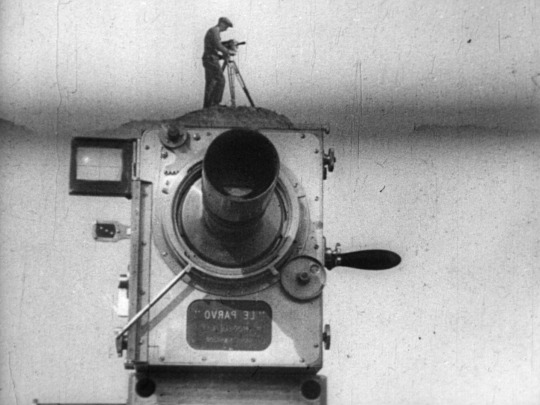
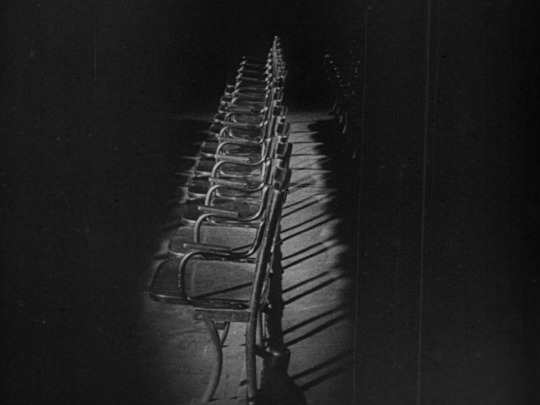

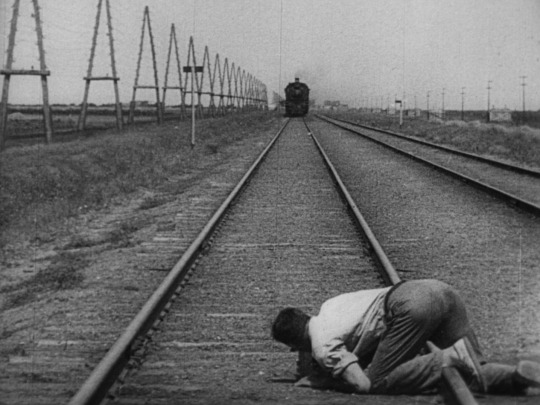
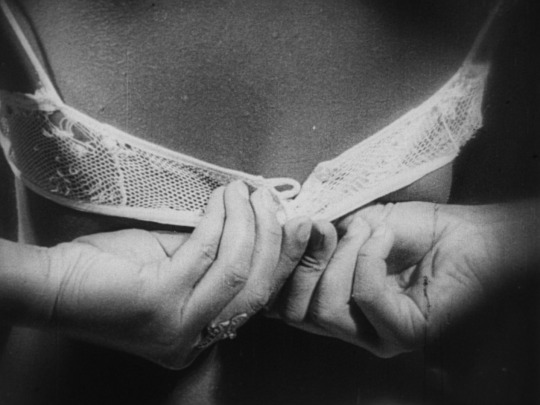
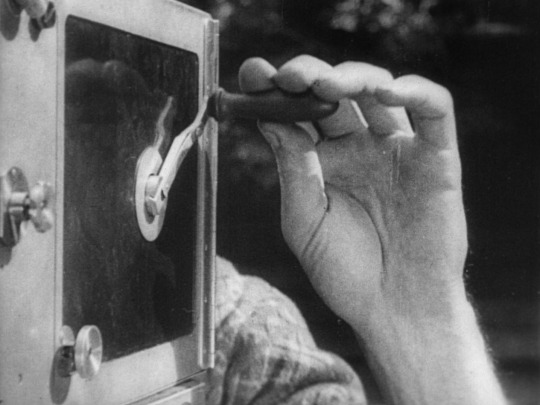


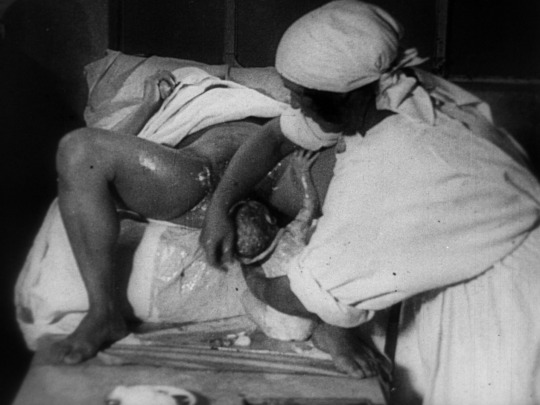
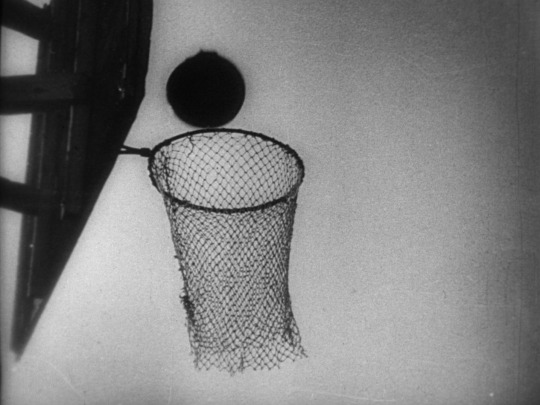


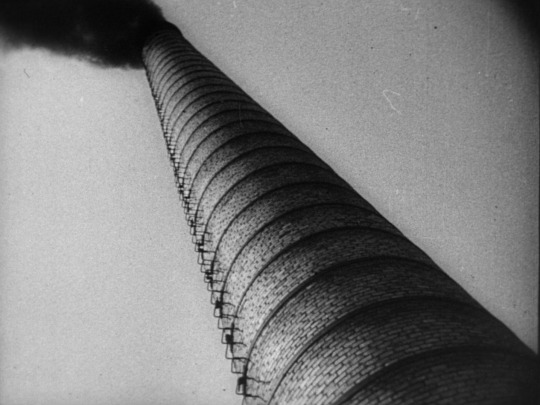
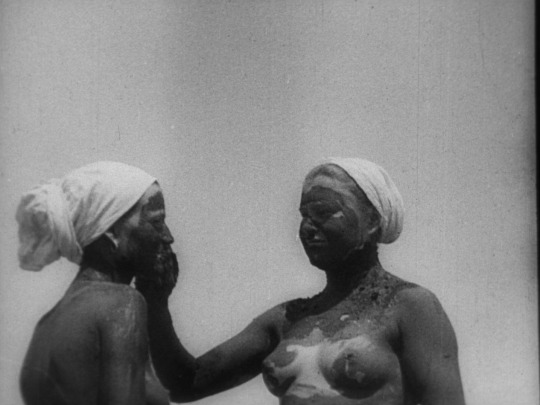
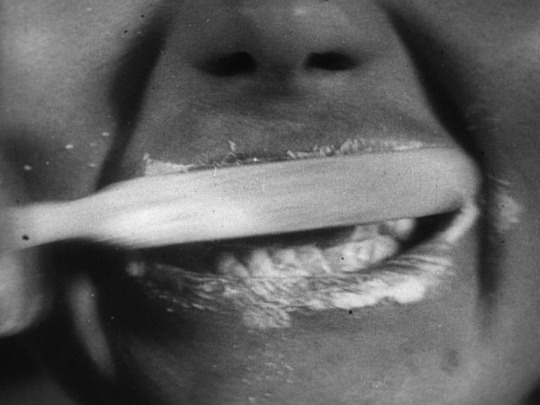

Man with a Movie Camera (1929)
Человек с киноаппаратом
Dir. Dziga Vertov
Cinematography by Mikhail Kaufman & Gleb Troyanski
A cameraman wanders around with a camera slung over his shoulder, documenting urban life with dazzling inventiveness.
#man with a movie camera#documentary#silent film#dziga vertov#mikhail kaufman#gleb troyanski#urban life#birth#death#society#1929#russia
3 notes
·
View notes
Photo
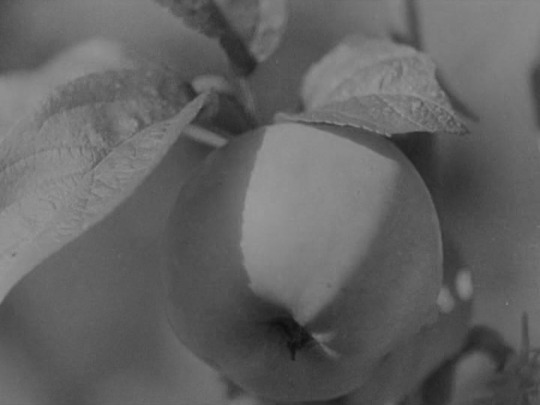
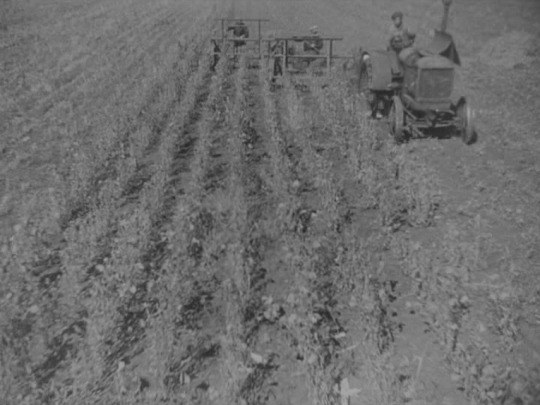

An Unprecedented Campaign (Mikhail Kaufman, 1931)
20 notes
·
View notes
Text
youtube
Check out this analysis of the Soviet film 'Man with a Movie Camera' (1929), by Dziga Vertov, Mikhail Kaufman, and Yelizaveta Svilova.
7 notes
·
View notes
Photo
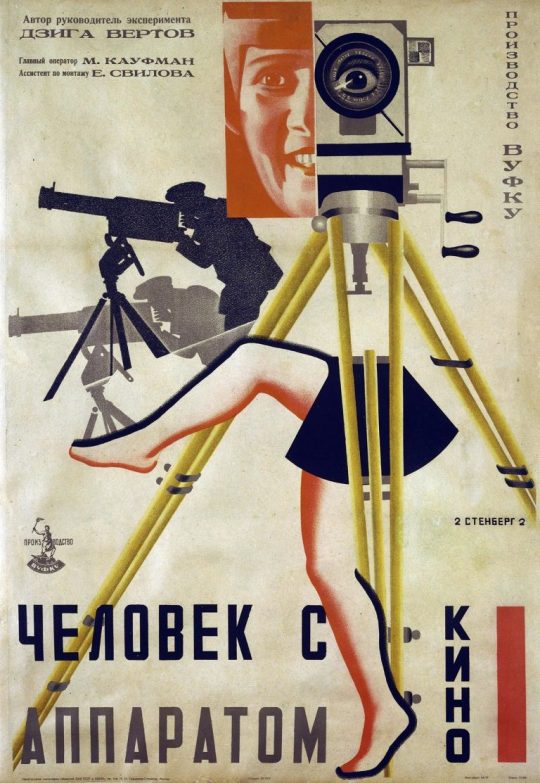
Das ist jetzt natürlich ein bisschen ein Trotzreaktion und hat überhaupt nichts mit Hollywood zu tun. Aber mit Stummfilm. Der Mann mit dem Kinoapparotom läuft durch die sozialistische Stadt und filmt ohne Zwischentitel, ohne Szenario und ohne Hilfe des Theaters. Das erstaunliche ist, daß man ihn sogar dabei sieht, wie er genau diesen Film dreht. Und interessanterweise auch die Cutterin. Es ist ein bisschen wie in der Sinfonie der Großstadt (hier), aber versponnener. Eisenstein befand, es sei sinnlose Kamera-Randale. Heute gilt er als drittbester ukrainischer Film aller Zeiten.
2 notes
·
View notes
Text
Man with a Movie Camera
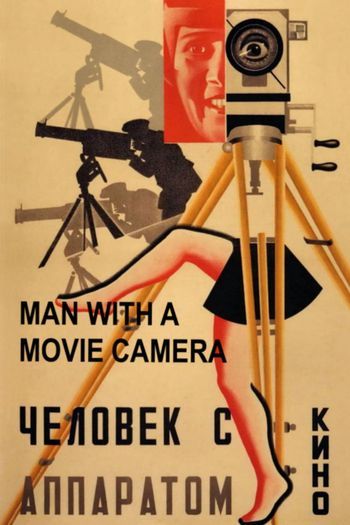
Man with a Movie Camera [trailer]
A man travels around a city with a camera slung over his shoulder, documenting urban life with dazzling invention.
A fascinating watch, by now almost a hundred years old.
Besides documenting life back then (the large number of trams!) it really is noteworthy how it uses a number of inventive film making techniques, like, changes in camera speed, split screens, fast cuts, and even stop motion animation.
I had to quiet down the newly added score since I found it increasingly intrusive.
#Man with a Movie Camera#Chelovek s kino-apparatom#Dziga Vertov#Mikhail Kaufman#foreign#Russia#Ukraine#recommended#documentary#black and white#silent
0 notes
Text
youtube
весной, mikhail kaufman 1929
0 notes
Text

Mikhail Kaufman was the on screen cameraman and off screen cinematographer for Man with a Movie Camera (1929). Mick was born in what is now Poland, and had 10 cinematography credits from a 1923 short to a 1940 documentary. All but his first credit are for documentaries.
0 notes
Text
In Spring (1929): A Kyiv symphony
In Spring (1929): A Kyiv symphony
When I am not on duty at Silent London, I write for less prestigious outfits. Speaking of which, I have a monthly column in Sight and Sound – have done for a year now. I use this column mostly to talk about the places where young cinema and old cinema meet. My last column was a little different. It’s about the most moving cinema experience I had all year: watching Mikhail Kaufman’s In Spring…

View On WordPress
#featured#In Spring#Mikhail Kaufman#Misha Kalinin#Roksana Smirnova#Sight & Sound#silent film#Stumfilmdager#Tromsø
0 notes
Photo

Mikhail Kaufman Soviet Avant-garde Artists Aleksandr Rodchenko and Varvara Stepanova in Their Studio, Moscow 1922
114 notes
·
View notes
Photo
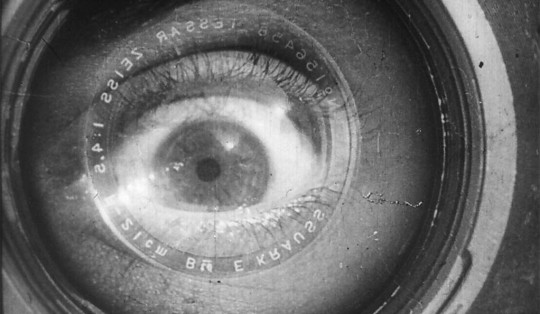
Man With a Movie Camera (Dziga Vertov, 1929)
Cast: Mikhail Kaufman, Elizaveta Svilova. Scenario: Dziga Vertov. Cinematography: Mikhail Kaufman. Film editing: Dziga Vertov.
As the truism has it, the movies taught us to see. But the great achievement of Man With a Movie Camera, the thing that causes critics to repeatedly put it on lists of the greatest films of all time, is that it helps us understand what the movies are making us see. In its tour of a city in the Soviet Union -- actually a composite of four cities: Kiev, Kharkov, Moscow, and Odessa -- the film works by montage, by swift cutting from one scene to another, juxtaposing birth and death, marriage and divorce, humanity and the machine, and any number of other supposed antitheses, giving us a sense of the interwoven texture of life itself. But at the same time, it exposes us to its own tricks: It shows a carload of people, then it shows us the cameraman precariously perched in another automobile, filming the group. It could even have pulled back to show us the camera filming the car with the cameraman who is filming the original carload, but by that time we've gotten the idea: Movies, like any attempt to construct reality, which we do in every waking moment, are a trick of perception. "Dziga Vertov," which translates from Ukrainian as something like "spinning top," was the pseudonym of a director also known as Denis Kaufman, whose brother, Boris Kaufman, won an Oscar as the cinematographer for On the Waterfront (Elia Kazan, 1954). Unlike Boris, Denis remained in the Soviet Union until his death in 1954, a loyal Marxist who was considered a major director and film theorist well into the 1930s, though his later career was stymied by the ideological changes that took place under Stalin. His wife, Elizaveta Svilova, worked as his editor, and the actual "man with a movie camera" seen in the film was his other brother, Mikhail Kaufman. Man With a Movie Camera is one of the essential films, even today, when almost everyone is a person with a movie camera in the shape of a smartphone in their pocket.
4 notes
·
View notes
Text
135 planos que harán que recuperes la fe en el cine
youtube
Un maravilloso vídeo ensayo de hace diez años que en su momento se hizo viral.
En el verano de 2012, Flavorwire solicitó a sus lectores que sugirieran aquellas películas que consideraban eran las mejores de la historia del cine. El resultado, un montaje que la revista de cultura editó con los títulos propuestos por sus lectores y que rinde un hermoso homenaje al séptimo arte.
Si eres amante del cine, seguro que disfrutarás de los magníficos ocho minutos que dura el montaje de Flavorwire.
Las películas de las que se han extraído los planos, en orden de aparición:
Man with a Movie Camera (Mikhail Kaufman), The Assassination of Jesse James by the Coward Robert Ford (Roger Deakins), Baraka (Ron Fricke), Koyaanisqatsi (Ron Fricke), Days of Heaven (Nestor Almendros), Akira Kurosawa’s Dreams (Takao Saito, Shoji Ueda), What Dreams May Come (Eduardo Serra), Legends of the Fall (John Toll), Lawrence of Arabia (Freddie Young), El Topo (Rafael Corkidi), La Dolce Vita (Otello Martelli), The Tree of Life (Emmanuel Lubezki), Daughters of the Dust (Arthur Jafa), Chinatown (John A. Alonzo), Hero (Christopher Doyle), Kagemusha (Takao Saito, Shoji Ueda), The Night of the Hunter (Stanley Cortez), Ugetsu (Kazuo Miyagawa), Songs from the Second Floor (Istvan Borbas, Jesper Klevenas, Robert Komarek), The Black Stallion (Caleb Deschanel), Vertigo (Robert Burks), Manhattan (Gordon Willis), Apocalypse Now (Vittorio Storaro), Lovers of the Arctic Circle (Gonzalo F. Berridi), The Duellists (Frank Tidy), Powaqqatsi (Graham Berry, Leonidas Zourdoumis), Ran (Asakazu Nakai, Takao Saito, Shoji Ueda), Bombay Beach (Alma Har’el), 2001: A Space Odyssey (Geoffrey Unsworth), The Thin Red Line (John Toll), Cave of Forgotten Dreams (Peter Zeitlinger), The New World (Emmanuel Lubezki), Solaris (Vadim Yusov), The Diving Bell and the Butterfly (Janusz Kaminksi), I Am Love (Yorick Le Saux), A Matter of Life and Death (Jack Cardiff), Onibaba (Kiyomi Kuroda), Blue Velvet (Frederick Elmes), No Country for Old Men (Roger Deakins), I Am Cuba (Sergei Urusevsky), The Fountain (Matthew Libatique), There Will be Blood (Robert Elswitt), The Human Condition (Yoshio Miyajima), The Proposition (Benoit Delhomme), Raise the Red Lantern (Lun Yang, Fei Zhao), The Godfather Part II (Gordon Willis), 2046 (Christopher Doyle, Pung-Leung Kwan), Beauty and the Beast (Henri Alekan), Melancholia, (Manuel Alberto Claro), Road to Perdition (Conrad L. Hall), Alexander Nevsky (Eduard Tisse), Sunrise (Charles Rosher, Karl Struss), Blade Runner (Jordan Cronenweth), Citizen Kane (Gregg Toland), House of Flying Daggers (Xiaoding Zhao), Wings of Desire (Henri Alekan), Atonement (Seamus McGarvey), The Last Emperor (Vittorio Storaro), Before Night Falls (Xavier Perez Grobet, Guillermo Rosas), The Last Picture Show (Robert Surtees), The Red Shoes (Jack Cardiff), Down by Law (Robby Müller), Amelie (Bruno Delbonnel), Chungking Express (Christopher Doyle, Wai-keung Lau), Children of Men (Emmanuel Lubezki), Black Orpheus (Jean Bourgoin), The Leopard (Giuseppe Rotunno), The Age of Innocence (Michael Ballhaus), Perfume: The Story of a Murderer (Frank Griebe), Raging Bull (Michael Chapman), The Fall (Colin Watkinson), The Pillow Book (Sacha Vierny), Martha Marcy May Marlene (Jody Lee Lipes), Nosferatu the Vampyre (Jorg Schmidt-Reitwein), The Third Man (Robert Krasker), Good Night and Good Luck (Robert Elswitt), The Scarlet Empress (Bert Glennon), The Man Who Wasn’t There (Roger Deakins), Talk to Her (Javier Aguirresarobe), In The Mood for Love (Christopher Doyle, Pung-Leung Kwan, Ping Bin Lee), The Man Who Cried (Sacha Vierny), Santa Sangre (Daniele Nannuzzi), The Passion of Joan of Arc (Rudolph Maté), In Cold Blood (Conrad L. Hall), 8 ½ (Gianni Di Venanzo), Brazil (Roger Pratt).
_________________
Fuente: Flavorwire.
7 notes
·
View notes
Text
Jewish singers of Western classical music
Compiling this list — the last in this series for the foreseeable future, although I’m well aware that there are others that I could do — has been a frustrating experience.
What I’m looking for, ultimately, is self-identification, which isn’t always forthcoming. And you can’t always trust Encyclopedia Judaica, which follows Israeli policy in determining Jewish status, i.e., one Jewish grandparent makes you Jewish, no matter what. (This is settled law in Israel, and it’s caused no end of trouble.)
Also, I’m not willing to knowingly include here the likes of Alma Gluck, who was a practicing Christian Scientist for most of her adult life, nor Richard Tauber, a life-long, if largely nominal, Roman Catholic who was bewildered to learn, in 1933, that he did in fact have a Jewish grand-parent. Since I’ve tended to err on the side of caution, there may be artists who should be on this list but aren’t.
You also won’t find here a number of artists whom my instincts tell me must be Jewish, but who are being, or were in their time, insufferably coy about it. (Jake Arditti, Beniamino Gigli, Jonas Kaufman, Selma Kurtz, Margarete Matzenauer, Jakub Józef Orliński, Annie Rosen, Regina Sarfaty: I’m looking at all of you.)
I’ve had to be vague about birthplaces in some cases, because some of these singers were born in jurisdictions that either no longer exist or whose names have changed. (Poland didn’t exist as a nation when Rosa Raisa was born there, and I don’t know what part of Poland — Austrian, German, or Russian — she came from.)
What applies to the earlier lists also applies here: I’ve included many of the younger ones solely on the basis of reputation, without having heard them. Not all are or were A-listers, but they are all people who sing or sang Western classical music for a living, or taught others to do so, or a combination of the two.
And finally, I should point out that while stage names are now a rare phenomenon in classical music, they were fairly common in the past — especially for singers! (Richard Tucker was born Reuben Ticker, for example.)
Mario Ancona (1860-1931), baritone, Italy
Rafael Arie (1922-1988), bass, Bulgaria
Sharon Azrieli, soprano, Canada
Richard Bernstein, bass, USA
Rachel Blaustein, soprano, USA
John Braham (ca. 1775-1856), tenor, UK
Lucienne Bréval (1869-1935), soprano, Switzerland
Katharine Carlisle (Kitty Carlisle Hart; 1910-2007), soprano, USA
Aryeh Nussbaum Cohen, counter-tenor, USA
Netanya Davrath (1931-1987), soprano, USSR
Shannon Delijani, mezzo-soprano, USA
Jeanne Diamond, soprano, USA
Pauline Donalda (1882-1970), soprano, Canada
Edis de Philippe (1918-1978), soprano, USA
Daryl Freedman, mezzo-soprano, USA
Rachel Frenkel, mezzo-soprano, Israel
Blake Friedman, tenor, USA
Allan Glassman, tenor, USA
Hannah Goodman, soprano, USA
Oren Gradus, bass, USA
Sheri Greenawald, soprano, USA
Hermann Jadlowker (1878–1953), tenor, Latvia
Cheri Rose Katz, mezzo-soprano, USA
Solomon Khromchenko (1907-2002), tenor, Russia
Alexander Kipnis (1891–1978), bass-baritone, Russia
Nina Koshetz (1894–1965), soprano, Russia
Isa Kremer (1887-1956), soprano, Russia
Maya Lahyani, mezzo-soprano, Israel
Evelyn Lear (1926-2012), soprano, USA
Adèle Leigh (1928-2004), soprano, UK
Samuel Levine, tenor, USA
Brenda Lewis (1921-2017), soprano, USA
Assaf Levitin, baritone, Israel
Estelle Liebling (1880-1970), soprano, USA
Emanuel List (1888-1967), bass, Austria
George London (1920-1985), bass, Canada
Channa Malkin, soprano, Netherlands
Jeffrey Mandelbaum, counter-tenor, USA
Mikhail Medvedev (1852-1925), tenor, Russia
Robert Merrill (1917-2004), baritone, USA
Ottilie Metzger (1878-1943), contralto, Germany
Rinnat Moriah, soprano, Israel
Andrew Morstein, tenor, USA
Rosa Pauly (1894–1975), soprano, Austro-Hungarian Empire
Jan Peerce (1904-1984), tenor, USA
Roberta Peters (1930-2017), soprano, USA
Ian Pomerantz, bass-baritone, USA
Rosa Raisa (1893–1963), soprano, Poland
Miriam Rap-Janowska (also known as Miriam Janowsky; 1891-1992), soprano, Latvia
Judith Raskin (1928-1984), soprano, USA
Spencer Reichman, baritone, USA
Chen Reiss, soprano, Israel
Regina Resnik (1923-2013), mezzo-soprano, USA
Neil Rosenshine, tenor, USA
Aaron Marko Rothmuller (1908-1993), baritone, Yugoslavia
Charlotte de Rothschild, soprano, UK
Arieh Sacke, tenor, Canada
Gidon Saks, bass-baritone, Israel
Dalia Schaechter, mezzo-soprano, Israel
Doron Schleifer, counter-tenor, Israel
Joseph Schmidt (1904-1942), tenor, Romania
Friedrich Schorr (1888–1953), bass-baritone, Austro-Hungary
Rinat Shaham, mezzo-soprano, Israel
Neil Shicoff, tenor, USA
Beverly Sills (1929-2007), soprano, USA
Julia Sitkovetsky, soprano, UK
Wiliam Socolof, bass-baritone, USA
Daniel Sutin, baritone, USA
Jennie Tourel (1910-1973), mezzo-soprano, Canada
Richard Tucker (1913-1975), tenor, USA
Sandra Warfield (1921-2009), mezzo-soprano, USA
Nofar Yacobi, soprano, Israel
Jennifer Zetlan, soprano, USA
4 notes
·
View notes
Text
Warsaw Silent Film Days - 19th Edition.

The most famous film review organized by Poland’s National Film Archive - Audiovisual Institute (FINA) returns on October 19th!
Polish and foreign cinema accompanied by live music will be welcoming viewers over the course of four days at Iluzjon Cinema in Warsaw. The programme includes films of Polish, French, American, and Ukrainian production.
Per tradition, the festival will open with a Polish title. This time around, opening will be Emil Chaberski and Zbigniew Gniazdowski’s 1928 “Tajemnica Starego Rodu” (Mystery of an Old Lineage)—a drama starring Jadwiga Smosarska, queen of the Polish screen, in a double role. The opening will be followed by three differently themed screening sections.
The section “Ukrainian Silent Cinema” will present two films by Kyivan director Mikhail Kaufman, a largely forgotten filmmaker now being rediscovered, who for most of his career was undeservedly overshadowed by his brother Dziga Vertov. Musical bands from Ukraine will accompany both films.
In the section “Silent Cinema Behind the Scenes” we’ll celebrate the 100th anniversary of the introduction of 16mm tape, which happens to fall on this year. Expect a rare opportunity to view films projected from 16mm on the big screen.
Additionally, we’ll showcase films with furry critters in the limelight, recalling the canine leads of yesteryear’s silent cinema—including Jean, Cameo, and the greatest adventure film star, the German Shepherd Rin Tin Tin. Equine and elephantine fans will also find something to their interest in this section.
As every year, we’ve also kept our youngest viewers in mind. In addition to slapstick comedies featuring various animals, we’ll be showing a children’s comedy-drama: the first screen adaptation of the well-known American youth novel “Penrod and Sam.”
The programme also includes great dramas and melodramas that remain touching and gripping to this day, such as Tod Browning’s “The Unknown,” Clarence Brown’s “Smouldering Fires,” and Alexander Hertz’s “Ludzie bez jutra” (People with no Tomorrow).
Poland National Film Archive - Audiovisual Institute (affiliated to FIAF, FIAT-IFTA)
Warsaw Silent Film Days - 19th Edition
19-22 October 2023
Narbutta St. 50A
Warsaw, Poland.
For more detailed information regarding the festival along with its programme, please see the link below:
#Poland National Film Archive#FIAF#FIAT-IFTA#world day for audiovisual heritage#27 october#silent film#film festival#poland
0 notes
Video
youtube
Man with a Movie Camera (Russian: Человек с киноаппаратом, romanized: Chelovek s kinoapparatom) is an experimental 1929 Ukrainian Soviet silent documentary film, directed by Dziga Vertov, filmed by his brother Mikhail Kaufman, and edited by Vertov's wife Yelizaveta Svilova. Kaufman also appears as the eponymous Man of the film.
0 notes
Text
Film analysis- Man with a movie camera
- Documentary- Produced in 1929
- I think it’s a Russian based film
- Black and white film.
- The director is Dziga Vertov
- Characters- Mikhail Kaufman
- The main genre is adventure.
- The setting of this documentary takes place in the past, as it was produced in 1929. In the opening scene we start off in a movie theatre.
-The documentary is linear and it’s clips are taken over time.
- This documentary is silent so there's no narrator, there is only like a quirky musical soundtrack that’s played throughout the film along with all the clips.
- There’s a mixture of close ups, medium shots, long shots and full shots.
- Majority of the camera angles seem to be either straight on angles or high angles.
- In conclusion I personally found the film a little bit boring, I didn't find myself immersed in it, or like I wanted to watch more. But for how old the film is, I feel like it’s done quite well, the cuts and edits seemed to work cohesively and weren't too harsh, also the music I think worked well to it, especially since it was a silent film and there was no narration.
- Jameelah
0 notes